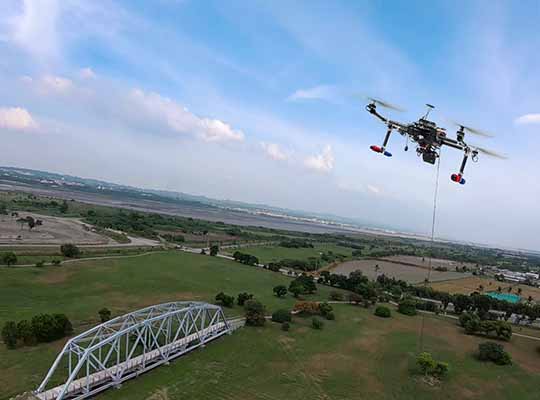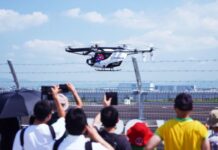Natural disasters can occur all over the world and restoring communications is essential for first responders to support the time-critical needs of victims and reinstating the supply of essential services such as drinking water, food and electricity.
A Japanese engineering company, Fukaden Corporation, is enabling this humanitarian effort by providing power for mobile communication base stations that are designed into their high-powered tethered drones. These lightweight, portable drones can be deployed by first responders to deliver near-instant communication capabilities once onsite. This provides first responders the support they need to make decisions and communicate swiftly.
In collaboration with major telecommunications carriers in Japan, Fukaden has conducted demonstration tests of its Power Control BOX II Main Power Supply Unit, which delivers power via a tether to the drone. It enables 1kW of power to be delivered up to 150 meters. Also power can be scaled easily by using units in parallel to triple the power to 3kW, which provides cellular service to a 10km diameter.
Higher voltage enables lighter and thinner cable
Historically, the drawback of tethered drones has been the thickness and weight of the power cable. Long, heavy cable adds weight creating more drag, which requires more power and limits the ability to add new features to the drone, such as sensors or high-resolution video cameras.
Fukaden drones require 1kW to 5kW of power, and increasing the supply voltage from 24V to 370V reduces supply current by 15x. This facilitates the use of a thinner tether cable, which reduces the weight of the 1kW tether cable by more than 10x, from 125g to 11.1g per meter.
Running 370V up to the drone requires a high density, lighter DC-DC converter module to be installed in the drone to step the power down to DC 24V, which is needed to drive the motor.
The initial Fukaden high-voltage DC-DC converter design was heavy and consumed too much space. So, the company searched for a small, lightweight DC-DC converter and replaced the large converter with a Vicor DCM™ power module.
The Vicor DCM is an isolated DC-DC converter module that uses high-frequency, zero-voltage switching (ZVS) technology and is characterized by high conversion efficiency and high output-power density. Using the DCM reduced the volume by 75 percent and cut the weight by more than 50 percent.
Building higher-performance communication drones
The next-generation Fukaden communication drone requires up to 9kW of power. By using higher voltage power (DC 700V), thinner cabling and upgrading to three Vicor BCM® bus converters in parallel, Fukaden was able to scale the power up to 4.5kW. To further scale to nearly 9kW, two Fukaden power supply units can be connected in parallel.
With the added power, the drone can fly for 92 hours and maintain a communication area diameter of 10km. The improved performance also helps the base station to perform better in all types of inclement weather.
The small and lightweight power modules made it easy to design and scale power and facilitated mounting the drone base station for mission-critical, life-saving deployments. Fukaden portable base station units are quickly becoming essential first-responder equipment when natural disasters strike. The versatility and portability will be a boon to relief efforts in Japan and across the world.




















